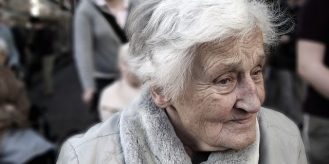As the proportion of older people and life expectancy are both increasing throughout the world, there is a growing awareness of the need to address the health, well-being, and safety of the elderly. At the same time, as they age, many elderly are increasingly at risk of abuse at the hands of their caregivers and others. Such abuse can take the form of physical attacks, financial exploitation, neglect of their needs, and emotional abuse.
In Israel, the challenges of elder abuse are leading to the development of programs to identify, treat, and also prevent elderly abuse and neglect.
On August 11, 2014, as part of the Ministry of Foreign Affairs’ MASHAV program to promote international professional exchange, the Myers-JDC-Brookdale Institute (MJB) held its first seminar on combating elderly abuse in Israel. The fourteen participants included academics, lawyers, social workers and policymakers from a range of developing countries in Europe, Asia, Central America, and Africa.

The second seminar in the series took place on February 8, 2015, when MJB hosted some 25 professionals, policymakers, and academics from Africa, Central Europe, and the Far East. They learned about elderly abuse in Israel from a range of experts .

The seminars began with a presentation from JDC-Israel’s Dr. Sara Alon, who spoke about different types of elderly abuse, developments in Israel, and programs and tools for identifying mistreatment and protecting the elderly.
She was followed by Dr. Mickey Schindler, from Bar Ilan University and Yad Riva, who outlined the status of Israeli law and its application in prevention and punishment of elderly abuse.
Barbara Lang, the Ministry of Health’s National Coordinator for Prevention of Elder Abuse, described the principles that guide Israel’s health funds and hospitals in identifying and treating victims of neglect and bullying.
Tying the seminars together was MJB’s Dr. Ayelet Berg-Warman, who explained how the Institute’s evaluation of programs to prevent abuse and treat elderly sufferers identified the most effective and helpful methods.
In the lively debates following the presentations, participants shared how different cultures regard aging and treat (or, unfortunately mistreat) their elderly. They reflected on their own countries’ attitudes to caring for and protecting the elderly, and the various factors that shape those attitudes .
The seminars provided an opportunity for MJB and its Israeli professional partners to share their expertise and promote Israel’s social innovations with an international audience. It also helped to reinforce MJB’s unique position as an Institute that actively links research, policy, and practice to bring about positive social change.
The seminars began with a presentation from JDC-Israel’s Dr. Sara Alon, who spoke about different types of elderly abuse, developments in Israel, and programs and tools for identifying mistreatment and protecting the elderly.
She was followed by Dr. Mickey Schindler, from Bar Ilan University and Yad Riva, who outlined the status of Israeli law and its application in prevention and punishment of elderly abuse.
Barbara Lang, the Ministry of Health’s National Coordinator for Prevention of Elder Abuse, described the principles that guide Israel’s health funds and hospitals in identifying and treating victims of neglect and bullying.
Tying the seminars together was MJB’s Dr. Ayelet Berg-Warman, who explained how the Institute’s evaluation of programs to prevent abuse and treat elderly sufferers identified the most effective and helpful methods.
In the lively debates following the presentations, participants shared how different cultures regard aging and treat (or, unfortunately mistreat) their elderly. They reflected on their own countries’ attitudes to caring for and protecting the elderly, and the various factors that shape those attitudes .
The seminars provided an opportunity for MJB and its Israeli professional partners to share their expertise and promote Israel’s social innovations with an international audience. It also helped to reinforce MJB’s unique position as an Institute that actively links research, policy, and practice to bring about positive social change.




